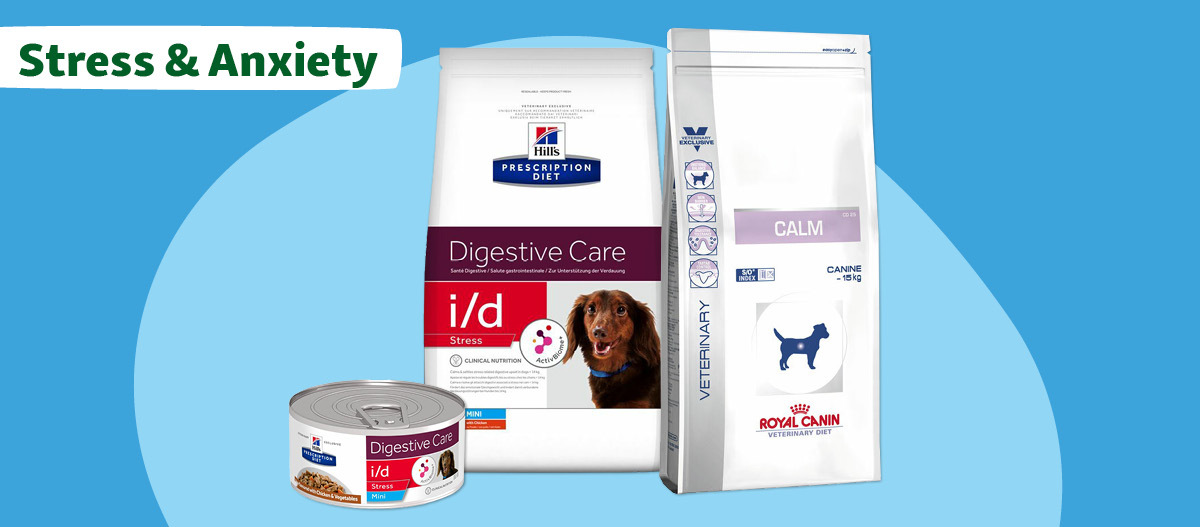Recognise Stress Signals Early So That You and Your Dog Can Have a Relaxed Life
07.10.2022 - Reading time: 3 minutes

Our dogs accompany us in most things that we do every day. This exposes them to countless situations, sounds and scents many of which they are not used to and which can trigger stress. It is important to be able to recognise stress signals early so that you and your dog can have a relaxed life.
What can trigger stress in dogs?
Many things that we consider to be completely normal can cause a dog to feel panicked or worried. Whether it is the loud television with strange sounds, the sirens of an emergency vehicle, New Year’s Eve fireworks or a tight crowd of people in the pedestrian zone – there are many possible causes of stress and these often aren’t clear to humans.
How can you tell whether your dog is particularly tense? Ultimately, a dog is unable to tell you when he is worried about something. However, if you watch your dog closely, you can tell when he is clearly telling you which situations or circumstances cause him to feel worried – through his behaviour and body language.
For this reason it is important that you know your dog’s body language precisely and that you observe your dog in everyday life. In this way, you will also pick up on less obvious stress signals.
How do dogs show stress?
Just as the triggers for stress are many and varied and they differ from dog to dog, the number of signs are also numerous. Some animals become hyperactive, others suffering severe mental and physical tension tend to get stomach problems and again others become irritable or seem constantly tired.
If you go to the vet due to a problem with your dog’s health and she is unable to diagnose an illness after a thorough examination, you should also consider psychological problems such as stress factors.
The following signs may suggest that your dog is stressed:
- pacification signals such as his tail between his legs or turning his head away and then yawning
- recurrent licking of the mouth
- noisy barking that occurs more frequently or barking for a longer period of time
- muscle tension
- unpleasant odour from the mouth
- increased salivation
- trembling
- raising of the tail and neck hair
- recurrent diarrhoea
- frequent shaking
- heavy, shallow panting
- biting on the lead
- crouched body position
- stressed face
- self-harming behaviour, nibbling of the paws or chasing their own tail
- jumpy reactions (e.g., when your dog erratically starts to dig)
- whining and howling
- upset stomach
- excessive grooming
- all types of panic reactions
- disproportionate aggression
- destruction of objects
The above signs are the most easily recognisable and most frequent signals of stress in a dog. If you spot one or more symptoms in your dog, you should observe them very closely and try to find out which triggers upset them.
Are you unable to figure out why your dog is excessively tense? Then it is recommended that you take him to a veterinary behaviour specialist who will help you to identify and remedy the causes.

How does a dog relieve stress?
Stress itself is a normal reaction to an unknown or apparently threatening situation. The body releases adrenaline and the dog becomes tense and is on alert. It is only bad if the dog is unable to manage such tension on his own or is unable to develop any management strategies.
Well-socialised dogs who have been confronted with new stimuli and situations from a young age are mostly able to process unusual experiences well. Other dogs, however, require help from their owners to manage worrying situations or sounds so that they are able to relax again.
The following methods will help you to create a more relaxed atmosphere in everyday life and will help your dog to relieve his stress:
- Desensitisation measures – your dog is confronted with stress triggers in small doses and so slowly gets used to them.
- Gently introduce him to new situations or objects.
- Light, classical music is proven to calm and relax dogs.
- Regular joint activity times with you strengthen your bond and create a relaxed atmosphere.
- Try to have a good balance between exercise and training units on the one hand and quiet times on the other.
- After a long time and with conditioning you will also be able to calm your dog by using a command.
- If your dog is very stressed consider a trip to a veterinary behavioural specialist who can look at the physiological and psychological problems overall.


